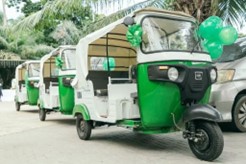17 June 2024
Creating a growth strategy is a very broad topic that has endless amounts of ways to approach it. As this was my graduation assignment topic, I was very excited to begin but needed to know more about the company before starting. Ekoglobe is a Tanzanian startup focused on clean technologies. From solar panels to water pumps and electric vehicles they have it all! My task was focused on how to increase sales revenue of Ekoglobe’s electric vehicles to $200,000 by the end of 2024. You might be thinking that sounds nice, but why does the company want to reach that goal? Ekoglobe is committed to providing underserved communities in Tanzania with clean technologies that not only aim to make their lives easier, but also reduce negative climate impacts caused by traditional methods. By reaching this revenue goal Ekoglobe will be able to make their technologies reach more widespread audiences and continue to further their mission.
To get more insight into the electric vehicles market in Tanzania I had to dissect a lot of information. The most interesting part of the data collection was interacting with stakeholders in Tanzania. Through video calls with Ekoglobe I was able to get a genuine feel for how the sustainable business environment works in East Africa. I also learned some important vocabulary words for the transit that locals use; Bajaj is a 3-wheeler typically used for taxis and Bodaboda is a motorcycle typically used for taxis.

I was also fortunate to get to interview an industry expert on the innovative developments that are emerging in Tanzania. For example, CNG-run 3-wheelers are developed by the Dar Es Salaam Institute of Technology. Additionally, speaking with Ekoglobe’s competitors also helped by further understanding the landscape limitations and opportunities within the e-mobility market.
After extensive research, several recommendations and conclusions arose. To increase sales revenue, Ekoglobe should focus on understanding the elements of the micro- and macroenvironment, listening to consumer preferences, and implementing growth strategies. The key microenvironment elements include product, price, and promotion. For the macroenvironment, political and economic factors are important to have a comprehensive understanding of due to regulations and economic trends having a direct impact on the ability to sell and buy electric vehicles.
The threat of substitution and competitive rivalry are also significant factors Ekoglobe should leverage in the market to increase their performance against other startups.
Consumer preferences revealed that farmers and taxi drivers are prime segments to target due to their positive attitude towards EVs and interest in cost savings. Lastly, using a combination of market penetration and market development strategies will help achieve the goal. By following these strategies and recommendations, Ekoglobe can achieve $200,000 in sales revenue from EVs by the end of 2024.
To achieve this ambitious goal, specific recommendations include forming partnerships with complementary businesses, implementing segmented marketing, taking part in trade fairs, and conducting educational seminars. Partnering with farming supplies stores can help advertise the vehicles designed for farming, while segmented marketing can target the agricultural and taxi driver segments effectively. Participating in trade fairs will showcase Ekoglobe’s products to a broader audience, and educational seminars will address the knowledge gap about EVs with potential customers. By executing these recommendations, Ekoglobe can enhance its market presence and drive significant sales growth.
Working on this project was an incredible opportunity to act as a consultant for a promising startup and allowed me to expand my intercultural knowledge. I got to learn more about the dynamic business environment and culture of Tanzania. This experience has inspired me to visit Tanzania in the future to see the beauty of the country and the impact of sustainable technologies.
A blog by: Lauren Campos
Participated in the Learning Community East Africa Hub
